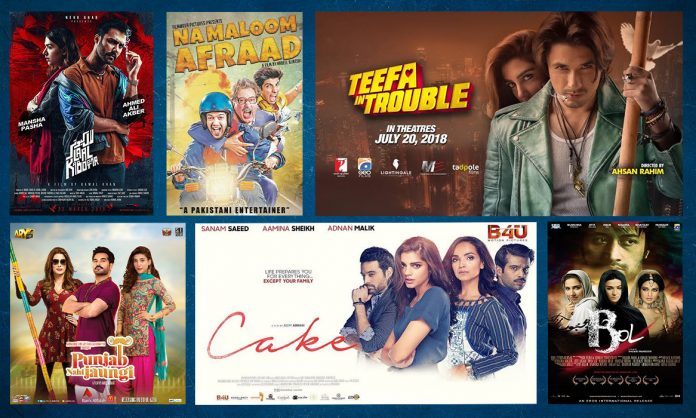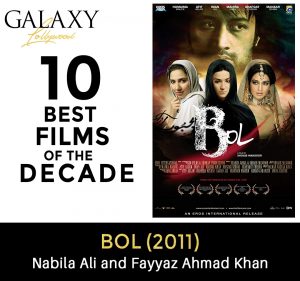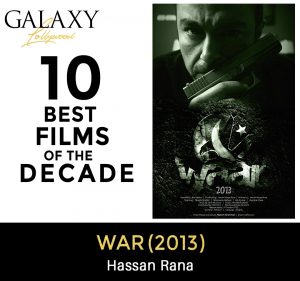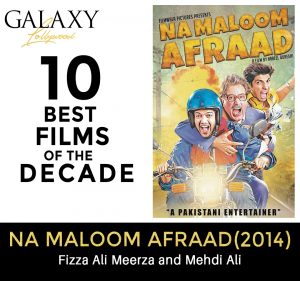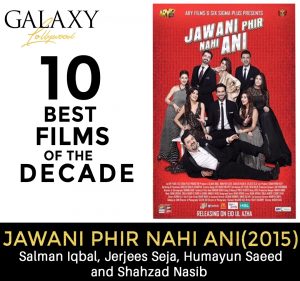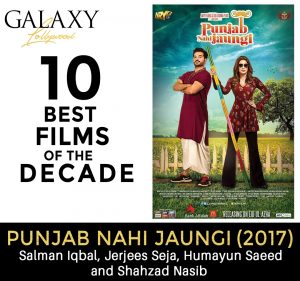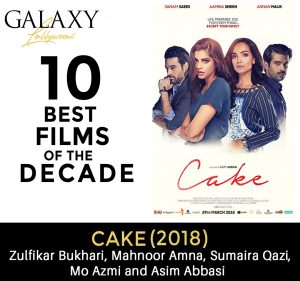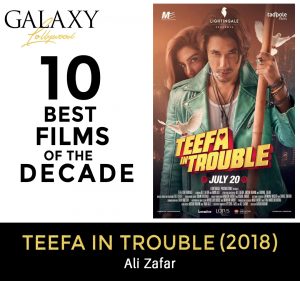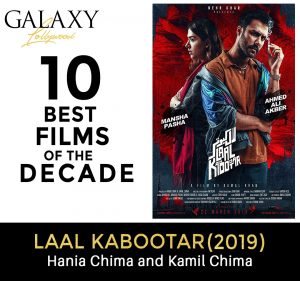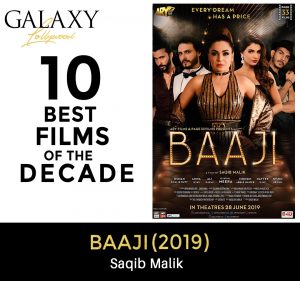The 2010s will forever be known as the most formative and decisive years for Pakistani cinema. It was during this decade that not only the Pakistani cinema went through its so-called revival stage but also, some of the films produced within these years established the very essence of modern Pakistani cinema. Be it due to the themes they explored or the way they were presented, Pakistani films made in this decade will go down in history as some of the most important ones.
We have, after much deliberation and discussion, jotted down 10 of the most important films made in Pakistan in the 2010s, listed chronologically below. These films might vary in genre and hold a difference in their box office earnings however, the impact of these films on Pakistani cinema as a whole cannot be argued.
Bol (2011)
Produced by: Nabila Ali and Fayyaz Ahmad Khan
This Shoaib Mansoor directorial is the brightest example of Pakistani cinema shaking out of its identity crisis. With stories and themes that were deeply seeped in the reality of Pakistani society, Bol was one of the first films of the decade that solidified the fact that Pakistan has stories to tell which belong completely and totally to Pakistan and are not influenced by the trends of Hollywood or Bollywood. The stellar representation of the lesser, if at all, discussed truths of the society wonderfully wound in a tight narrative that was both fascinating and disturbing make Bol a film that is to be cherished for many more years to come.
Waar (2013)
2013 was not a year where the audience was expecting any sort of groundbreaking cinema that was produced locally. And then came Waar. With Waar director Bilal Lashari did what was desperately missing from mainstream entertainment i.e. blending of the real-life events in a fictional narrative. It is also one of the first and few well-made movies that show a positive and heroic side of Pakistan’s armed saviors. This film gave Pakistan a chance to control its own narrative when the international media, especially Bollywood, was busy painting an image of the country that was profoundly negative. Waar gave the audience as well as the filmmakers of the country a taste of just how rich and fulfilling stories the country has to offer if only one would dare to step out of the comfort zone and commit to telling those stories with complete honesty.
Na Maloom Afraad (2014)
Produced by: Fizza Ali Meerza and Mehdi Ali
2014 was still the year when more than locally produced content (which was not high in numbers, to begin with) the audience was happily consuming international films. But Na Maloom Afraad was that pathbreaking film that proved that Pakistani films also have longevity to them and they are capable of running for long times at the cinemas. All it needs for the film is to be relatable and original, both the sentiments easily seen in the Nabeel Qureshi directorial Na Maloom Afraad. Based in the bustling city of Karachi and taking inspiration from some harsh realities of the said city, NMA is a clever, humorous, and earnest take on the desperation of a common man struggling to find stability in his life while living in an unstable city. NMA stayed away from glossy fanfare and instead focused on real-life characters that were instantly relatable for the audience. And it was this relatability that made the film run in the cinemas for a record 22 weeks.
Jawani Phir Nahi Ani (2015)
Produced by: Salman Iqbal, Jerjees Seja, Humayun Saeed, and Shahzad Nasib
Masala movies tend to get a lot of flak from the intellectual brand of audience who frown at any film that dares to be entertaining in a no-brainer sort of way. Jawani Phir Nahi Ani directed by Nadeem Baig showed those naysayers that an entertaining masala film is not always without a brain. The humorous writing of JPNA that was full of pop-culture references exclusive to the Pakistani society gave the audience a masala film that was not falling over its feet in trying to imitate someone else’s style. It very cunningly used the trappings of a typical comedy film and then redefined what it means to be an out-and-out Pakistani comedy film. The film is funny, witty, and became a part of the country’s pop culture all while setting standards of how far filmmaking in Pakistan has come.
Actor In Law (2016)
Produced by: Fizza Ali Meerza and Mehdi Ali
Another great example of blending the real-life events within a fictional narrative was the 2016 Nabeel Qureshi directorial Actor In Law. Coming after Na Maloom Afraad, Qureshi solidified the idea that a common man living in a metropolitan city has as many interesting stories to tell as a lesser privileged rural man. It is all about tapping within the desires and motivations the characters easily found within the society and presenting them cinematically. AIL also showed how social realities of the country need not always be shown from a depressing lens and a film can highlight the problems and issues of the society from a lighter angle that tethers on being optimistic, however, it gets the job done wonderfully.
Punjab Nahi Jaungi (2017)
Produced by: Salman Iqbal, Jerjees Seja, Humayun Saeed, and Shahzad Nasib
In the time when Pakistani cinema was all but completely disappeared from the mainstream, Pakistani dramas solidified their place as the most popular form of entertainment. And Punjab Nahi Jaungi was one of the very few successful attempts in bringing all the highs of a Pakistani drama on the big screen without losing that cinematic touch. It was also a film that cemented the love that the Pakistani audience has for romance and melodrama when it comes to movies.
Cake (2018)
Produced by: Zulfikar Bukhari, Mahnoor Amna, Sumaira Qazi, Mo Azmi, and Asim Abbasi
Unlike the western world, Pakistani society is all for appreciating and wholeheartedly accepting the joint family system. It is such a standard affair that no one questions the implications of this system and chooses to ignore the harsher realities of it. Cake turns to one such family that seems like a normal family and focuses on the intricate and complicated ties that bind them. The introspective manner of storytelling mixed with the deeper, universally acknowledged emotions makes Cake an interesting blend of art-cinema and mainstream movie. Cake shows the bolder and more mature side of Pakistani cinema which has evolved from engaging in loud and dramatic tussles to portraying complicated conflicts with nuance and sensibility.
Teefa In Trouble (2018)
Produced by: Ali Zafar
The audience loves action. And the audience loves humor. Teefa In Trouble brought the best of these two beloved genres and gave Pakistan an action-comedy film that truly redefined the standards of filmmaking in Pakistan. Director Ahsan Rahim paired up with actor, writer, producer, musician Ali Zafar and gave Pakistani cinema its true summer blockbuster which did not rely on the lucrative Eid release date to bring in big numbers on the box office. Teefa is a shining example of the statement that more than the date of the film’s release, it is the content of the film that sells. The film had slick action and rib-tickling humor. Teefa In Trouble tapped into what the audience actually wants from a Pakistani cinema in a way that very few other Pakistani films – a decent script presented in a captivating manner full of enjoyable performances and a foot-tapping soundtrack.
Laal Kabootar (2019)
Produced by: Hania Chima and Kamil Chima
Experimenting with new techniques and genres is a must if the industry has to evolve. And Laal Kabootar was one such successful experiment. A serious film set in the dark underbelly of the city of lights, Karachi, Laal Kabootar had looked like a risky venture from when its trailers were released. It did not serve anything “comfortable” to the audience i.e. it was very far from a standard well-lit, mainstream affair that the audience was used to watching. And that is where the film’s success lay. Because it dared to move away from the predictable style of filmmaking and had the courage to experiment with its genre and presentation, Laal Kabootar definitely proved that the audience is more than ready to invest in other subjects than just bubblegum floss style of films.
Baaji (2019)
Produced by: Saqib Malik
Pakistani cinema has a very rich and complex history that demands to be explored. In 2019 Saqib Malik did just that. Baaji delves deep into the darker side of Lollywood and explored the harsh realities behind the world of glitz and glamor. Baaji was dark and brutal and an enthralling cinematic experience for it tackled issues of stardom and the desperation to stay relevant in a world that has the shortest attention span. The film proved that there are many stories lurking in the seen and unseen corners of our everyday world and all it needs is to capture them in the right light for the audience is ready to watch them all.

